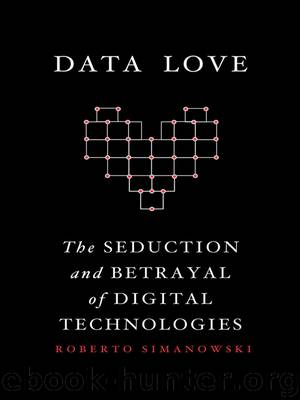Data Love by Simanowski Roberto;

Author:Simanowski, Roberto;
Language: eng, eng
Format: epub
Tags: SOC052000, Social Science/Media Studies, PHI040000, Philosophy/Movements/Critical Theory
Publisher: Columbia University Press
Published: 2016-09-12T16:00:00+00:00
13
DIGITAL HUMANITIES
IF in former times it was possible that an unmeasured hill could insult rationality, it is now rationality that—statistically instrumentalized—insults itself. The excesses in measurement of the cybernetic era turn rationality—radicalized as formal logic in the computer—into its own opponent. The delight in statistics, today so emphatically embraced, entails serious side effects: the aesthetics of the spectacle, the danger of populism, an illusion of truth, and the distortion of reality. Added to this is the internalization of the statistical perspective by society, which moves from quantified evaluations to yes/no dichotomies.
What is set out here from a perspective of cultural pessimism for others holds all the promises of the future, and not only for civil servants and businessmen. Science also invests high hopes in the “computational turn,” as do the humanities. The discussion is being carried out under the rubric of the “digital humanities” and aims at implementing algorithmic methods of analysis for humanities scholarship. Such methods have been practiced for some time in linguistics and computer-assisted philology in the form of automated corpus analysis, but they are now being widely adopted as a standard methodology. “The Humanities Go Google” is the title of an article on mathematizing the humanities that was featured as critique rather than promotion in The Chronicle of Higher Education, Technology.1 A prime example for work of this kind is that by the English professor Franco Moretti, the founder and director of the Literary Lab at Stanford University and author of books such as Graphs, Maps, Trees: Abstract Models for a Literary History (2005) and Distant Reading (2013). Distant reading—the algorithmic analysis of texts based on word occurrences and lexical patterns—is a requirement for graphs and maps. Only if a computer reads all the available texts of an epoch—as opposed to the literary scholar who, through close reading, covers at best only a bit more than the canon—can statistical statements on literary processes be turned into something that can be visualized. Moretti coquettishly calls it “a little pact with the devil: we know how to read texts, now let’s learn how not to read them.”2 It is a pact with the devil because it turns literary history away from reading and toward counting. It makes the literary text—whether canonized or not—disappear in macroperspectival structures.
It is exactly this paradigm of the number that more and more programs of research within the humanities adopt. The results can be found in several text collections with the term “digital humanities” in the title as well as in new research branches and methods like “culturomics” and “cultural analytics” as quantitative cultural studies of sorts. This process has been criticized as an academic variant of the neoliberal remodeling of society and as the sellout of science to the economic concept of efficiency.3 One can also understand it as a twofold answer to the problem of postmodern information society: All data are processed free of theory.
The promise of the computational turn for the humanities is new quality by way of new quantity. On
Download
This site does not store any files on its server. We only index and link to content provided by other sites. Please contact the content providers to delete copyright contents if any and email us, we'll remove relevant links or contents immediately.
| Anarchism | Communism & Socialism |
| Conservatism & Liberalism | Democracy |
| Fascism | Libertarianism |
| Nationalism | Radicalism |
| Utopian |
The Secret History by Donna Tartt(18143)
The Social Justice Warrior Handbook by Lisa De Pasquale(11950)
Thirteen Reasons Why by Jay Asher(8441)
This Is How You Lose Her by Junot Diaz(6428)
Weapons of Math Destruction by Cathy O'Neil(5820)
Zero to One by Peter Thiel(5484)
Beartown by Fredrik Backman(5343)
The Myth of the Strong Leader by Archie Brown(5235)
The Fire Next Time by James Baldwin(5013)
How Democracies Die by Steven Levitsky & Daniel Ziblatt(4950)
Promise Me, Dad by Joe Biden(4907)
Stone's Rules by Roger Stone(4851)
100 Deadly Skills by Clint Emerson(4683)
A Higher Loyalty: Truth, Lies, and Leadership by James Comey(4546)
Rise and Kill First by Ronen Bergman(4542)
Secrecy World by Jake Bernstein(4384)
The David Icke Guide to the Global Conspiracy (and how to end it) by David Icke(4376)
The Farm by Tom Rob Smith(4320)
The Doomsday Machine by Daniel Ellsberg(4240)
